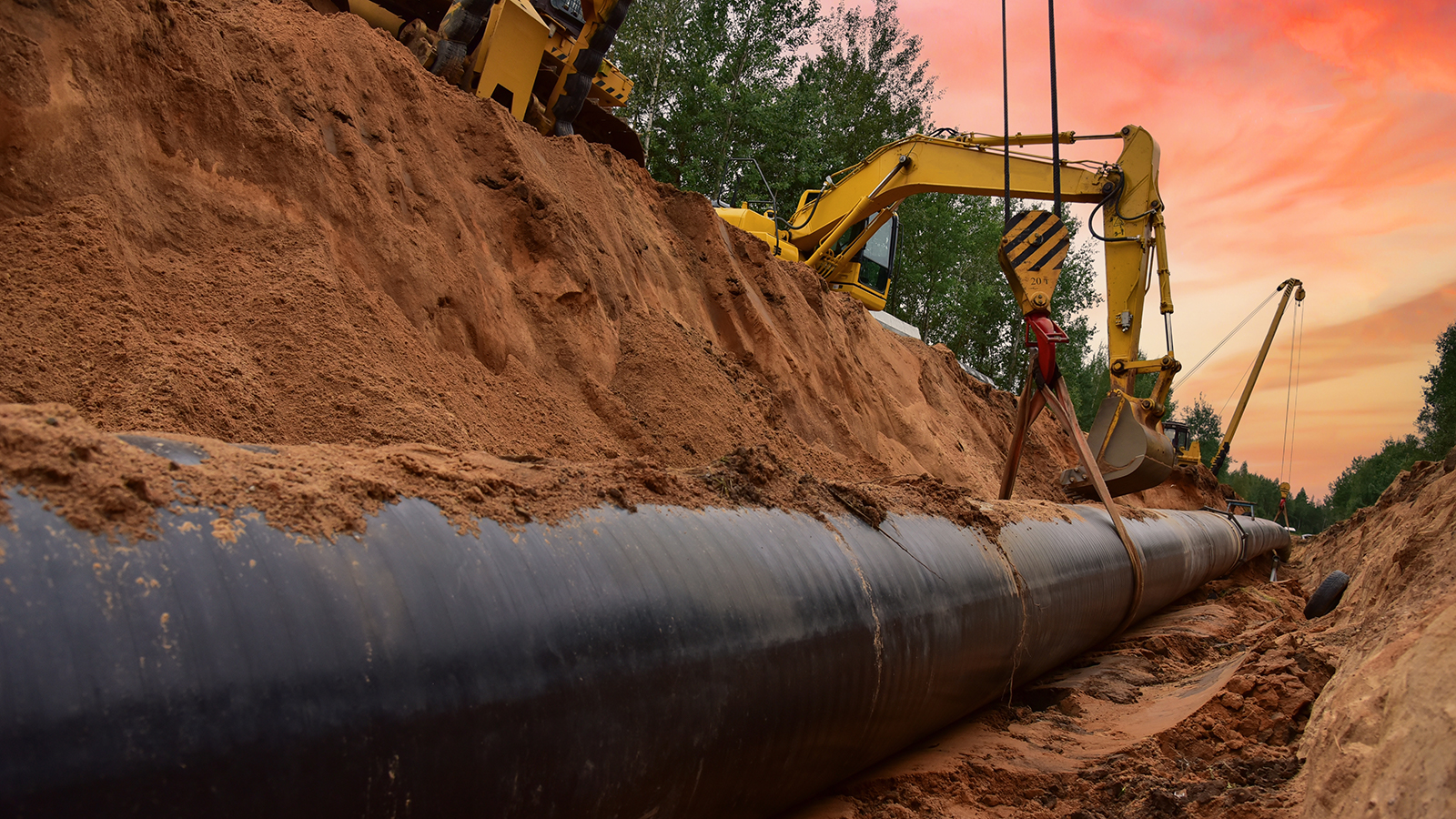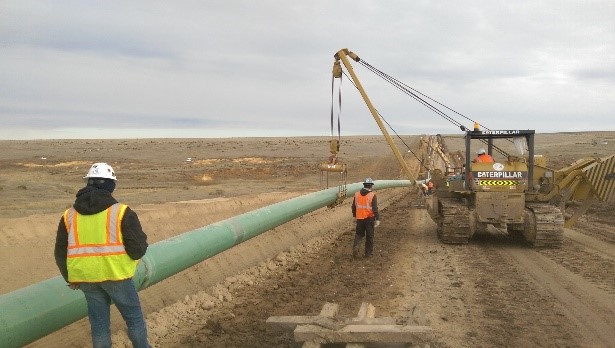The Future of Infrastructure: What Creek Pipe Company LLC Is Doing Differently
Wiki Article
A Comprehensive Overview to Understanding Pipes and Their Duty in Building
Pipes are vital components in construction, serving crucial functions in water, gas, and waste management. Their option and application can substantially influence a structure's performance and safety and security. Numerous products, such as PVC, copper, and PEX, supply distinctive advantages suited to specific needs (Creek Pipe Company LLC). Comprehending these aspects is vital for any type of building job. As one checks out the ins and outs of pipelines, the effects for conformity and public wellness ended up being progressively apparentThe Value of Water Lines in Building
Pipes offer as essential conduits in building and construction, assisting in the motion of water, gas, and waste throughout buildings and infrastructure. Their duty prolongs beyond simple transport; they are essential for ensuring the performance and security of commercial and domestic environments. Properly set up pipes add to the reliable distribution of sources, allowing day-to-day tasks such as food preparation, home heating, and bathing. Pipelines play an essential function in waste monitoring, guaranteeing that sewage and wastewater are properly eliminated from living spaces.The importance of pipelines is also shown in their effect on public wellness. Faulty or inadequate piping systems can bring about contamination and unsafe problems, making quality products and installment practices imperative. Additionally, pipes have to adhere to different building regulations and guidelines, which are created to safeguard both passengers and the atmosphere. As a result, the relevance of pipelines in construction encompasses both practical functionality and important health and wellness factors to consider.Kinds Of Water Lines Utilized in Building Projects
Various kinds of pipes play a considerable role in building projects, each made to satisfy certain requirements and applications. Among one of the most frequently utilized pipe types are PVC, which is immune and light-weight to rust, making it optimal for drainage and air vent systems. CPVC pipes, similar to PVC, can hold up against higher temperature levels, commonly made use of in warm water systems. Copper pipelines are recognized for their resilience and reliability, often used in plumbing and heating applications. Galvanized steel pipelines, while less usual today, were once a standard for water lines because of their toughness. Additionally, PEX (cross-linked polyethylene) pipelines are obtaining popularity for property pipes due to their adaptability and resistance to scaling and chlorine. Cast iron pipelines are preferred for their sound-dampening residential properties, frequently made use of in waste and dirt systems. Each pipe type serves distinctive features, making sure efficient procedure in building and construction projects.Common Materials for Water Lines and Their Properties
In construction, the option of pipeline products is essential for ensuring longevity and capability. Steel pipelines use strength and resistance to high stress, while plastic pipelines provide corrosion-resistant and light-weight choices. Compound pipelines integrate the advantages of both materials, making them functional options for various applications.Steel Pipe Options
Metal pipes are important parts in building and construction, supplying a series of choices that satisfy ecological conditions and various applications. One of the most usual products consist of steel, copper, and cast iron. Steel pipes are known for their strength and toughness, making them ideal for high-pressure applications. Copper pipelines are favored for their rust resistance and antimicrobial residential or commercial properties, frequently used in pipes systems. Cast iron pipelines give superb noise insulation and are optimal for waste and drainage systems. Each steel kind has distinctive advantages; as an example, galvanized steel can resist corrosion, while stainless steel offers premium deterioration resistance. Choosing the appropriate steel pipeline depends on elements such as cost, ecological exposure, and the certain needs of the building project.
Plastic Pipeline Advantages
Plastic pipes have actually obtained popularity in construction because of their light-weight nature and versatility. These pipes, made from materials such as PVC, CPVC, and PE, offer superb resistance to deterioration and chemical damages, making them appropriate for numerous applications. Their ease of installment further improves their charm, as they can be reduced and joined without special tools. Furthermore, plastic pipelines are typically a lot more cost-efficient contrasted to steel alternatives, adding to lower overall project costs. Their smooth indoor surfaces reduce rubbing and improve flow prices, while insulation buildings aid keep temperature control in plumbing systems - Creek Pipe Company. With a variety of configurations and dimensions readily available, plastic pipelines properly satisfy the diverse requirements of contemporary building and construction projectsCompound Pipe Characteristics
Composite pipelines incorporate numerous materials to leverage their individual toughness, resulting in boosted efficiency and resilience. Usually, these pipes include layers that may include steels, plastics, and ceramics, each contributing one-of-a-kind homes. The internal layer may be made of a corrosion-resistant product, while the outer layer gives stamina and impact resistance. This mix allows composite pipelines to endure severe temperatures and pressures, making them ideal for a vast array of applications, consisting of supply of water and commercial procedures. Furthermore, composite pipes are frequently lighter than typical products, promoting less complicated handling and setup. Their convenience and flexibility to different atmospheres make them a recommended choice in contemporary building projects, making sure longevity and effectiveness in liquid transportation systems.Applications of Pipeline in Pipes Solutions

Electrical Conduits: The Duty of Pipes in Wiring
In contemporary building, electric channels play a crucial function in making sure the risk-free and reliable directing of electrical circuitry throughout buildings. These pipelines give a safety pathway for electric wires, securing them from physical damages and environmental factors. Various materials, such as PVC, steel, and flexible channels, are utilized relying on the particular needs of the installation.Furthermore, avenues help in organizing electrical wiring systems, lowering the danger of electrical dangers like brief circuits or fires. They likewise assist in less complicated upkeep and upgrades, as cables can be accessed and replaced without substantial interruption to the structure.Proper installment of electrical conduits is essential for compliance with building ordinance and safety and security guidelines. This structured strategy not only enhances the durability of the electric system but also adds to the total security and capability of the building, making electrical conduits vital in contemporary construction techniques.Picking the Right Pipeline for Your Project
How can one guarantee the ideal pipeline choice for a construction job? The selection process begins with comprehending browse around this site the details requirements of the job, including the kind of liquids being delivered, pressure ratings, and environmental problems. Product choices, such as PVC, copper, and steel, need to be examined based upon resilience, rust resistance, and thermal properties.Next, one need to take into consideration the pipe's size and flow capability to identify effective operation. Regulatory requirements and codes should also be adhered to, as they dictate the acceptable products and techniques for details applications. Consulting with professionals and making use of substantial sources can additionally assist in making notified decisions.Finally, evaluating the cost-effectiveness of different choices is important, stabilizing preliminary expenses with long-term maintenance and substitute costs - Creek Pipe Company. By thoroughly analyzing these factors, one can confidently choose the most appropriate pipe for their construction project, ensuring both functionality and compliance
Upkeep and Evaluation of Water Lines in Building
Proper choice of pipelines sets the structure for their lasting efficiency, making maintenance and evaluation crucial components in building. check my site Normal upkeep guarantees that any type of potential concerns, such as leakages, rust, or clogs, are determined and dealt with without delay, reducing costly repairs and project hold-ups. Scheduled evaluations, including visual analyses and stress tests, play a vital role in reviewing the stability of pipe systems.Additionally, checking ecological factors, such as temperature level variations and soil problems, can assist expect damage. Using innovative innovations, such as CCTV for interior examinations, can improve the performance of maintenance efforts. It is crucial to record examination searchings for and maintenance activities to establish an extensive background of the pipe systems. By focusing on maintenance and examination, building professionals can expand the life expectancy of their piping systems, guaranteeing they operate efficiently and accurately throughout the task's duration.Regularly Asked Concerns
Exactly How Do Pipelines Influence Energy Effectiveness in Structures?
Pipes considerably affect power effectiveness in buildings by managing heating and cooling down systems. Correct insulation and materials minimize power loss, while reliable plumbing layouts reduce water usage, ultimately causing lower power usage and operational expenses.What Regulations Govern Pipe Setup in Building?
Rules controling pipeline setup in building commonly consist of neighborhood and nationwide structure codes, pipes codes, and safety and security criteria. These assurance compliance with structural integrity, material requirements, and wellness needs, advertising security and performance in building practices.Can Pipes Be Recycled After Usage?
The inquiry of pipe recyclability is substantial. Lots of materials, such as steel and particular plastics, can be recycled properly. The problem and kind of pipe influence recycling feasibility, necessitating correct assessment before disposal.
How Do Climate Condition Effect Pipeline Performance?
Climate condition considerably influence pipe efficiency. Severe temperatures can create expansion or contraction, while dampness may result in deterioration. Furthermore, hefty rainfall can increase soil stress, influencing stability and total capability of the piping system.What Are the Signs of Pipe Failing to Expect?
Signs of pipeline failing consist of leakages, unusual noises, discoloration of water, minimized water pressure, and visible rust. Regular inspections can assist identify these problems early, making sure and protecting against costly repairs system performance in the long-term. Pipes play a critical function in waste administration, making sure that sewer and wastewater are properly removed from living spaces.The relevance of pipes is also reflected in their impact on public health. In building and construction, the option of pipeline products is essential for ensuring durability and functionality. Metal pipes supply toughness and resistance to high stress, while plastic pipelines give light-weight and corrosion-resistant alternatives. Furthermore, pipes are utilized to eliminate wastewater, connecting toilets, sinks, and drains pipes to local sewage systems or septic tanks.Different types of pipes, such as PVC, copper, and PEX, are picked based on aspects like click here to read toughness, expense, and particular application needs. Just how can one ensure the best pipeline choice for a building task?Report this wiki page